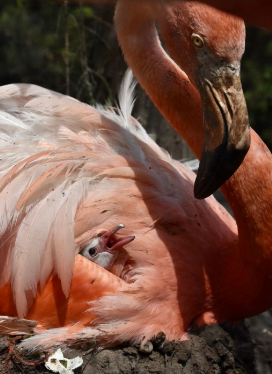
MANHATTAN —The first baby born recently at Sunset Zoo is a white-handed gibbon.
The parents, Dempsy, and Leslie recently gave birth to their second baby in three years, baby Neta, according to a media release from the zoo.
Neta was born at the end of April and is doing well. The sex of baby Neta will not be determined until a full physical occurs which typically happens at the end of the first year of life.
The Zoo usually takes its time to announce the birth to ensure the health and adjustment of the new family unit go well. "We are excited and happy that this family of gibbons is doing so well. This is the second baby for our family of gibbons and it is amazing to see them all interacting together," said Scott Shoemaker, director of Sunset Zoo.
The baby was named by the primate zookeeper team. "The name Neta was chosen by our team to honor 2019-2020, Kansas State University Veterinary Intern named Neta that held a special place in her heart for primates. Neta also means potted plant in Hebrew. We certainly look forward to seeing our little family grow," said Savannah Hiatt, head zookeeper at Sunset Zoo.
This family of gibbons was recommended to breed by the Association of Zoos and Aquariums as part of a Species Survival Plan.
White-handed gibbons are critically endangered due to habitat loss, illegal logging, and hunting for the illegal pet trade. The population of gibbons has decreased in the wild almost 80 percent in the last 20 years. White-handed gibbons are small, tailless arboreal apes found mainly in tropical rainforests in Southeast Asia.
Additionally, on July 6, a Caribbean flamingo named Ringo has joined our flock at Sunset Zoo. Ringo was named by our South American Keeper, Trevor Smith.

"I am glad to see our flock thrive and learn about the caretaking process through new births like Ringo. The baby is fitting in quite well with our entire collection," said Smith.
The Caribbean flamingos are not on the endangered list at this time and are stable and increasing their population.
Caribbean flamingos are found on the north coast of South America, the Yucatan Peninsula in Mexico, and on several Caribbean islands.
Flamingo feathers are known for distinctive pink and orange colors from the carotenoids in the foods that the birds eat. Flamingo chicks are born with grey feathers and do not typically take on their distinctive pink coloring until they are about two years of age.
To see the new arrivals, Sunset Zoo is welcoming visitors daily from 9:30 a.m. - 3 p.m. with social distancing guidelines in place due to COVID-19. Masks are required when visiting the zoo and six-foot distancing cannot be maintained. Masks are required in all indoor areas of the zoo. To learn about visiting Sunset Zoo please visit www.sunsetzoo.com or call Sunset Zoo guest services at 785-587-2737.
About Sunset Zoo
Home to over 200 amazing animals Manhattan's Sunset Zoo offers an up-close view to some of nature's most fascinating wonders, including tigers, snow leopards, flamingos, and a jumping, hooting array of primates! Visitors might even cross paths with one of the vibrant peacocks that roam freely throughout the 26-acre park.
Accredited by the Association of Zoos and Aquarium (AZA) in 1989, Sunset Zoo is committed to upholding the highest standards of animal care and to providing a fun, safe, and educational family experience. More about the AZA can be found here.
Sunset Zoo is open 360 days a year and is currently operating from 9:30 am to 3:00 pm daily. Located at 2333 Oak Street, the Zoo is tucked inside the residential area near Manhattan High School’s West Campus.
Learn more by visiting online at SunsetZoo.com, by calling 785-587-2737, or by following the Zoo on social media!





